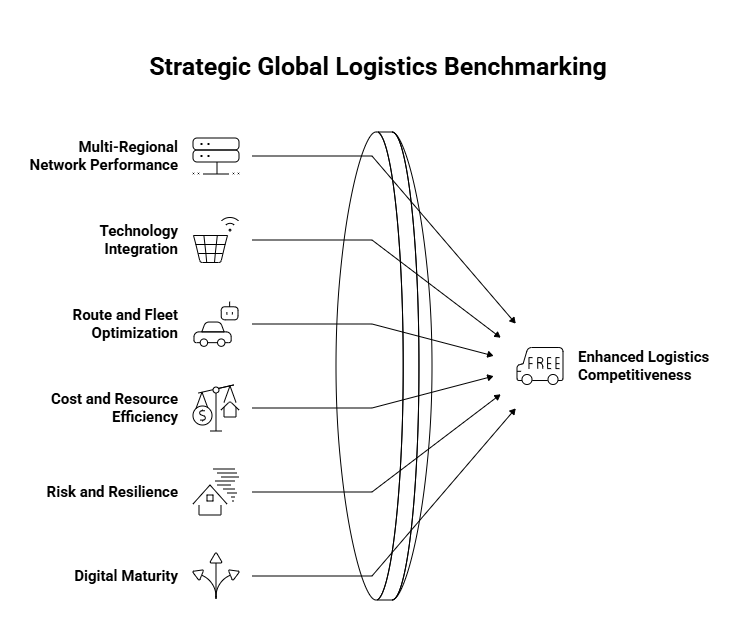The global logistics landscape is being reshaped by technology, data, and cross-border complexity. With the surge in e-commerce, multimodal freight operations, and dynamic supply chain demands, logistics competitiveness now hinges on a company’s ability to integrate and optimize its digital network.
From AI-powered route optimization and IoT-enabled fleet monitoring to real-time visibility platforms and cloud-based warehouse management systems, technology is a necessity. Yet many logistics enterprises face a persistent challenge: they lack clear benchmarks to evaluate the effectiveness of these technologies across regions and functions.
As networks expand, performance gaps widen, hidden inefficiencies in fleet utilization, transit times, and data integration often go unnoticed until they affect customer experience or cost-to-serve.
Nexdigm’s Global Logistics Competitiveness Technology Benchmarking Framework helps logistics leaders close this gap. By benchmarking technology maturity, operational performance, and digital infrastructure across markets, Nexdigm empowers enterprises to make data-driven decisions that optimize networks, reduce costs, and enhance global agility.
Nexdigm’s Global Logistics Competitiveness Technology Benchmarking Framework
In a world where logistics performance depends on speed, visibility, and adaptability, Nexdigm’s Global Logistics Competitiveness Technology Benchmarking Framework acts as a strategic tool to measure, compare, and optimize the technologies powering supply chains worldwide.
By combining competitive intelligence, operational analytics, and digital infrastructure assessment, Nexdigm enables logistics companies to identify performance bottlenecks, benchmark their digital readiness against global peers, and enhance network-wide efficiency.
Core Components of the Framework

- Multi-Regional Network Performance Benchmarking: Nexdigm evaluates transport corridors, warehousing hubs, and delivery networks across markets, benchmarking throughput, reliability, and service time against international best practices.
- Technology Integration and Data Flow Assessment: The framework assesses how well TMS (Transport Management Systems), WMS (Warehouse Management Systems), and visibility platforms communicate in real time to support seamless cross-border coordination.
- Route and Fleet Optimization Analysis: Benchmarking includes the evaluation of AI-driven route planning, GPS tracking accuracy, fleet telematics, and load utilization, identifying inefficiencies that inflate cost-to-serve or extend delivery cycles.
- Cost and Resource Efficiency Evaluation: Nexdigm compares key metrics such as fuel usage, turnaround time, vehicle idle rate, and warehouse energy efficiency, helping companies discover where digital systems can deliver measurable savings.
- Risk and Resilience Benchmarking: We analyze disruption recovery times, redundancy in network planning, and real-time response agility, ensuring that logistics systems remain resilient in times of crisis.
- Digital Maturity and Innovation Readiness Assessment: The framework measures the adoption and effectiveness of automation, IoT, analytics, and blockchain technologies within logistics operations, mapping them against global innovation leaders.
- Sustainability and ESG Performance Review: Benchmarking includes carbon emissions per shipment, route efficiency, and energy footprint, aligning logistics competitiveness with emerging sustainability standards.
- Network Optimization Roadmap: All findings are consolidated into a strategic improvement roadmap, identifying short-term quick wins and long-term modernization goals across logistics technology, operations, and infrastructure.
Nexdigm’s benchmarking framework transforms logistics performance from reactive optimization to proactive intelligence. Thus, helping global enterprises design agile, technology-enabled, and resilient supply chains.
To take the next step, simply visit our Request a Consultation page and share your requirements with us.
Harsh Mittal
+91-8422857704

